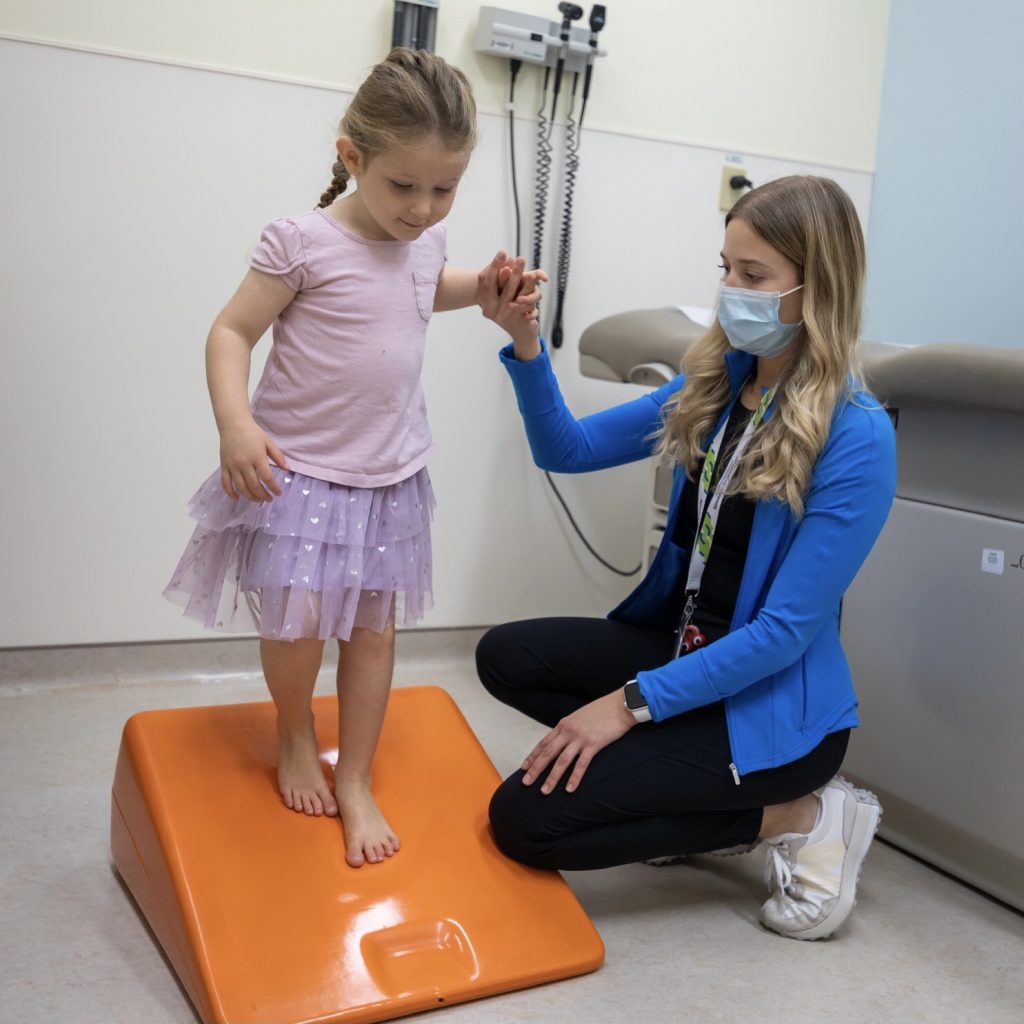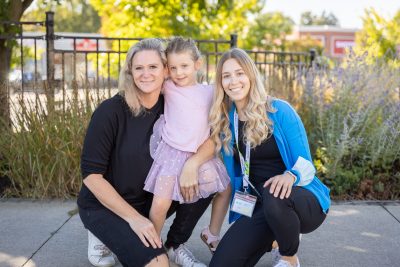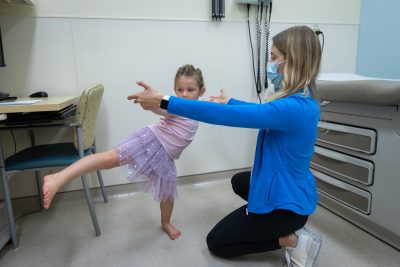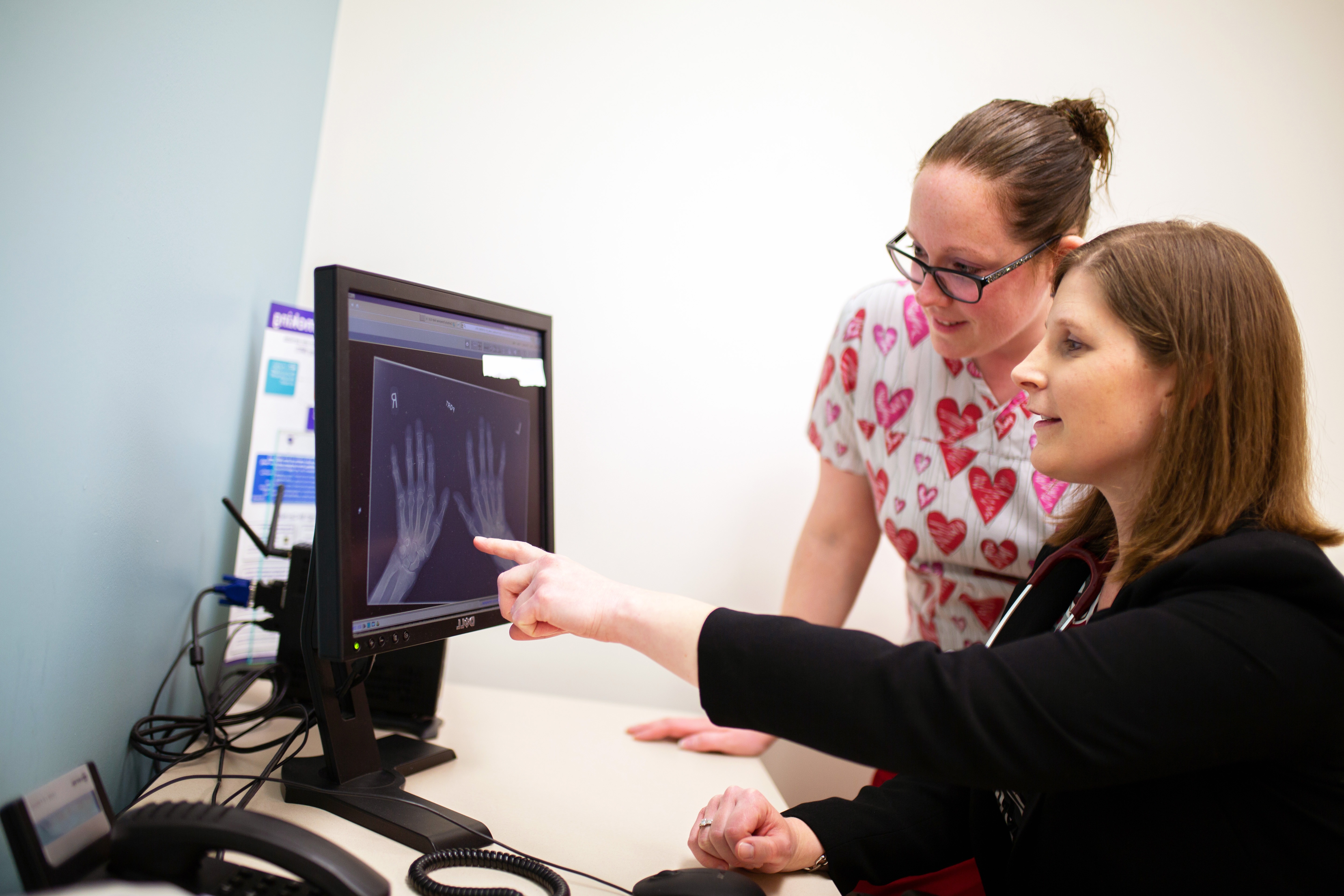
MCH Steppingstones gives toddlers with arthritis a leg up
Toddler Katherine Urquhart was playing at the park when her mother noticed she was limping. “I thought her sock might be bunched up,” recalls Alana Hurov. “But the limp didn’t go away.”
Over the next few weeks, Katherine underwent a variety of tests at her local Niagara hospital and then Hamilton Health Sciences’ McMaster Children’s Hospital (MCH), which led to a diagnosis of juvenile idiopathic arthritis (JIA).
Formerly called juvenile rheumatoid arthritis, JIA can affect any joint and is the most common type of arthritis in children and teens. Idiopathic means the cause isn’t known and it showed up suddenly. In Canada, three in every 1,000 kids are affected.
Diagnosing arthritis in a toddler

Alana Hurov (left) with her daughter Katherine Urquhart and HHS registered physiotherapist Maddie Fyfe
Katherine’s symptoms included chronic, painful swelling in her left knee and ankle. The three-year-old continues to receive treatment by weekly injection to control the disease, which has been in remission for months. But even when the swelling disappeared and the pain was under control, Katherine continued to limp.
Toddlers who experience arthritic pain when developing gross motor skills like walking, running and climbing stairs often favour their good leg, says Julie Herrington, an advanced physiotherapist practitioner at MCH.
“With enough practice, it’s possible to completely correct ingrained walking habits if we intervene early enough.” — Maddie Fyfe, registered physiotherapist
This, in turn, causes the arthritic limb to grow weaker, and kids may develop walking abnormalities such as a limp or turned-out foot. Even when medication knocks arthritis into submission and kids are pain-free, limping continues because it has become an ingrained habit.

Julie Herrington, advanced physiotherapist practitioner
“These children could potentially carry on with these habits for the rest of their lives because patterns developed in early childhood are very difficult to unlearn,” says Herrington. But it’s possible to correct walking techniques through physiotherapy. And the earlier, the better.
That’s why Herrington and Maddie Fyfe, an HHS registered physiotherapist with MCH’s pediatric rheumatology clinic, developed Steppingstones, a play-based, six-session physiotherapy program for patients ages two to five with JIA. Patients must be referred to the program by their specialist.
Changing habits through play therapy
This intensive, play-based approach helps children build strength and learn proper walking habits. The program focusses on the foot and ankle, but in the future may expand to include the knee. Sessions are one-on-one with Fyfe and the child. Parents learn physiotherapy techniques by observing.
“The difference it has made in our lives has been massive.” — Alana Hurov, parent

Maddie Fyfe, registered physiotherapist
Katherine and her mom took part in the pilot last spring and found it extremely helpful. “I really see the value in this program,” says Hurov. “The difference it has made in our lives has been massive.”
While there’s still a strength difference in Katherine’s legs, it’s much less pronounced. “You would never know in a million years that Katherine has JIA,” says Hurov. “She easily keeps up with other kids now. We’re so grateful for the support and care that we have received at McMaster Children’s Hospital. The team has become like family to us.”
Overcoming obstacles – the fun way
Herrington and Fyfe recognized the need for Steppingstones after noticing that some young patients continued to protect their foot, even when in remission and living pain-free.
Video: Registered physiotherapist Maddie Fyfe and patient Katherine Urquhart, 3, demonstrate foot and ankle exercises learned through the Steppingstones program:
Steppingstones uses a fun kid-sized obstacle course to re-train and strengthen the affected foot. It includes uneven surfaces like play mats as well as stairs, a balance beam and mini trampoline, with fun games in between. Fyfe accompanies the child through the course, correcting foot positioning and encouraging strengthening exercises.

Katherine Urquhart, 3, demonstrates exercises she learned through the Steppingstones program.
“With enough practice, it’s possible to completely correct ingrained walking habits if we intervene early enough,” says Fyfe.
Katherine was one of three children taking part in the pilot. Before joining, the children were assessed to see if they needed custom orthotics from the prosthetics and orthotics department at HHS’ Ron Joyce Children’s Health Center. “By wearing this to sessions, their foot is in the ideal positon to work on strengthening,” says Fyfe. Funds are available to help families cover the cost if needed.
Plans are in the works to offer the Steppingstones program again in November and December.
Sharing their success
Herrington and Fyfe are presenting the Steppingstones program at an online conference organized by Cassie + Friends, a national charity that is dedicated to pediatric rheumatic disease, including JIA, and provides financial support to Steppingstones. The conference takes place Oct. 25 from 7:30 to 8:30 p.m. Hurov will share a parent perspective and Dr. Joyce Obeid from McMaster University will discuss the power of play for children and adolescents growing up with a chronic medical condition or disability.
Participation is free and anyone can join but registration is required.



